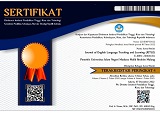A case study of EFL students’ perceptions on the use of English songs in learning English vocabulary
Abstract
Keywords
Full Text:
PDFReferences
Aguirre, D., Bustinza, D., & Garvich, M. (2016). Influence of songs in primary school students’ motivation for learning English in Lima, Peru. English Language Teaching, 9(2), 178–191. https://doi.org/10.5539/elt.v9n2p178
Anas, I. (2019). Educational technology and teacher-student technology competency: A pathway to teaching English with technology. JELTL (Journal of English Language Teaching and Linguistics), 4(2), 181–191. http://dx.doi.org/10.21462/jeltl.v4i2.270
Asmali, M. (2017). Young learners’ attitudes and motivation to learn English. Novitas-ROYAL (Research on Youth and Language), 11(1), 53–68. https://eric.ed.gov/?id=EJ1167207
Brown, A. (2009). Students’ and teachers’ perceptions of effective foreign language teaching: A comparison of ideals. Modern Language Journal, 9(1), 46–60. https://doi.org/10.1111/j.1540-4781.2009.00827.x
Çevikbaş, G., Yumurtacı, N., & Mede, E. (2018). Effects of songs on the development of vocabulary among first grade EFL learners. Language Teaching and Educational Research (LATER), 1(2), 101–120. https://eric.ed.gov/?id=ED591135
Creswell, J. W. (2015). Educational research: Planning, conducting, and evaluating quantitative and qualitative research (5th ed.). Pearson Education. https://thuvienso.hoasen.edu.vn/handle/123456789/12789
Dumford, A. D., & Miller, A. L. (2018). Online learning in higher education: Exploring advantages and disadvantages for engagement. Journal of Computing in Higher Education, 30, 452–465. https://doi.org/10.1007/s12528-018-9179-z
Ehri, L. C., & Rosenthal, J. (2007). Spellings of words : A neglected facilitator of vocabulary learning. Journal of Literacy Research, 39(4), 389–409. https://doi.org/10.1007/978-1-4419-0834-6_10
Israel, H. F. (2013). Language learning enhanced by music and song. Literacy Information and Computer Education Journal, 2(1), 1360–1366. http://dx.doi.org/10.20533/licej.2040.2589.2013.0180
Javadi-safa, A. (2018). Effects of using songs on adult EFL learners ’ vocabulary learning. Journal of Applied Linguistics and Language Research, 5(3), 101–112. http://jallr.com/index.php/JALLR/article/view/816
Kocaman, O. (2016). The effects of songs on foreign language vocabulary acquisition. In O. Titrek, I. Mikelsone, L. Pavitola, & G. S. Gultekin (Eds.), The 2nd International Conference on Lifelong Education and Leadership for All (pp. 116–126). Sakarya University Faculty of Education.
Kolinsky, R., Lidji, P., Peretz, I., Besson, M., & Morais, J. (2013). Processing interactions between phonology and melody: Vowels sing but consonants speak. Cognition, 112(1), 1–20. https://doi.org/10.1016/j.cognition.2009.02.014
Kuśnierek, A. (2016). The role of music and songs in teaching English vocabulary to students. World Scientific News, 43(1), 1–55. https://api.semanticscholar.org/CorpusID:55640937
Laufer, B., & Nation, P. (1995). Vocabulary size and use: Lexical richness in L2 written production. Applied Linguistics, 16(3), 307–322. https://doi.org/10.1093/applin/16.3.307
Maess, B., Koelsch, S., Gunter, T. C., & Friederici, A. D. (2001). Musical syntax is processed in Broca’s area: An MEG study. Nature Neuroscience, 4(5), 540–545. https://doi.org/10.1038/87502
Marion, W., Burden, R. L., Poulet, G. M. A., & Mau, I. C. (2008). Learners ’ perceptions of their successes and failures in foreign language learning. Language Learning Journal, 30(1), 19–29. https://doi.org/10.1080/09571730485200191
Masrai, A., & Milton, J. (2017). Recognition vocabulary knowledge and intelligence as predictors of academic achievement in EFL context. TESOL International Journal, 12(1), 128–142. https://eric.ed.gov/?id=EJ1247860
McCarten, J. (2007). Teaching vocabulary lessons from the corpus lessons for the classroom. Cambridge University Press.
Meesong, P. K., & Jaroongkhongdach, W. (2016). Autonomous language learning: Thai undergraduate students’ behaviors. Thai Tesol Journal, 29(2), 156–186.
Muhamad, N., & Rahmat, N. H. (2020). Investigating challenges for learning English through songs. European Journal of English Language Teaching, 6(1), 1–15. https://doi.org/10.46827/ejel.v6i1.3270
Nation, I. S. P. (2001). Learning vocabulary in another language. Cambridge University Press. https://doi.org/10.1017/9781009093873
Nation, P. (2010). Best practice in vocabulary teaching and learning. In J. C. Richards & W. A. Renandya (Eds.), Methodology in language teaching: An anthology of current practice (pp. 267–272). Cambridge University Press.
Octaberlina, L. R. (2023). English for young learning method through games and songs for elementary school. World Journal of English Language, 13(6), 203–210. https://doi.org/10.5430/wjel.v13n6p203
Palmer, C., & Kelly, M. H. (1992). Linguistic prosody and musical meter in song. Journal of Memory and Language, 31, 525–542. https://doi.org/10.1016/0749-596X(92)90027-U
Pavia, N., Webb, S., & Faez, F. (2019). Incidental vocabulary learning through listening to songs. Studies in Second Language Acquisition, 41(4), 745–768. https://doi.org/10.1017/S0272263119000020
Phisutthangkoon, K., & Panich, M. (2016). Effectiveness of English song activities on vocabulary learning and retention. The European Conference on Language Learning, 1–12. https://api.semanticscholar.org/CorpusID:56137262
Robah, A., & Anggrisia, N. F. (2023). Exploring challenges and strategies in English speaking among Indonesian university students: A case study of AKM university. Englisia: Journal of Language, Education, and Humanities, 11(1), 55–74. https://doi.org/10.22373/ej.v11i1.19156
Shrestha, E., Mehta, R. S., Mandal, G., Chaudhary, K., & Pradhan, N. (2019). Perception of the learning environment among the students in a nursing college in Eastern Nepal. BMC Medical Education, 19(382), 1–7. https://doi.org/10.1186/s12909-019-1835-0
Stanlee, T. J., & Singh, S. S. A. B. (2021). Effectiveness of using technology based songs to enhance vocabulary competency among year two undergraduate students at Universiti Malaysia Sabah (UMS). Sains Insani, 6(1), 162–166. https://doi.org/10.33102/sainsinsani.vol6no1.269
Sundqvist, P., & Sylvén, L. K. (2016). Extramural English in teaching and learning: From theory to research practice. Palgrave Macmillan. https://doi.org/10.1057/978-1-137-46048-6
Tasnim, Z. (2022). Songs for EFL/ ESL class: How to teach listening skill. MEXTESOL, 46(3), 1–12. https://eric.ed.gov/?id=EJ1364959
Thornbury, S. (2003). Teaching vocabulary using short texts. Asian Efl Journal, 5(4), 1–6.
Trinick, R. M. (2011). Sound and sight: The use of song to promote language learning. General Music Today, 25(2), 5–10. https://doi.org/10.1177/1048371311402066
Wallace, W. T. (1994). Memory for music: Effect of melody on recall of text. Journal of Experimental Psychology Learning, Memory, and Cognition, 20(6), 1471–1485. https://psycnet.apa.org/doi/10.1037/0278-7393.20.6.1471
Wangru, C. (2016). Vocabulary teaching based on semantic-field. Journal of Education and Learning, 5(3), 64–71. https://doi.org/10.5539/jel.v5n3p64
Werner, R. (2018). Music, movement and memory: Pedagogical songs as mnemonic aids. TESOL Journal, 9(4), 1–11. https://doi.org/https://doi.org/10.1002/tesj.387
Wesely, P. M. (2012). Learner attitudes, perceptions, and beliefs in language learning. Foreign Language Annals, 45(S1), 98–117. https://doi.org/10.1111/j.1944-9720.2012.01181.x
Yin, R. K. (2011). Applications of case study research (3rd ed.). SAGE Publications, Inc.
DOI: https://doi.org/10.18860/jetle.v5i2.25908
Refbacks
- There are currently no refbacks.
Jalan Gajayana 50 Malang 65144, Jawa Timur, Indonesia

This work is licensed under a Creative Commons Attribution-ShareAlike 4.0 International License.
Indexed by





